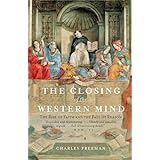
Average Reviews:

(More customer reviews)I am grateful for the care with which Amazon readers have reviewed my book whether they have agreed with my argument or not. The reviews are worth a reply.
My thesis is that Christianity was heavily politicised by the late Roman empire, certainly to the extent that it would have been unrecognisable to Jesus. Note the linking of the church to the empire's success in war, opulent church building and an ever narrowing definition of what beliefs one had to hold to be saved. (Hand in hand with this went an elaboration of the horrors of hell, a radical and unhappy development which can only have discouraged freedom of thought.) My core argument is that one result of the combination of the forces of authority (the empire) and faith (the church) was a stifling of a sophisticated tradition of intellectual thought which had stretched back over nearly a thousand years and which relied strongly on the use of the reasoning mind.
I did not depend on Gibbon. I do not agree with him that intellectual thought in the early Christian centuries was dead and I believe that the well established hierarchy of the church strengthened not undermined the empire. After all it was the church which survived the collapse of the western empire. Of course, Gibbon writes so eloquently that I could not resist quoting from him at times but my argument is developed independently of him and draws on both primary sources and recent scholarship.
On the relationship between Christianity and philosophy I argue that there were two major strands of Greek philosophy , those of Plato and Aristotle. The early church did not reject Greek philosophy but drew heavily on Platonism to the exclusion of Aristotle. In the thirteenth century Christianity was reinvigorated by the adoption of Aristotelianism , notably by Thomas Aquinas. It seems clear that Christianity needed injections of pagan philosophy to maintain its vitality and a new era in Christian intellectual life was now possible. I don't explore it in this book. Even so, when one compares the rich and broad intellectual achievements of the `pagan' Greek centuries with those of the Middle Ages, it is hard to make a comparison in favour of the latter. Where are the great names? (The critic who mentioned the ninth century philosopher Erigena should also have mentioned that he was condemned as a heretic.)
When one reads the great works of second and third century AD thinkers such as Plutarch, Galen, Ptolemy and Plotinus, which are remarkable for their range and depth, one cannot but feel that much has been lost in the west by the fifth century. Something dramatic happened in the fourth century. In 313 Constantine brought the traditional policy of Roman toleration for different religious beliefs to its culmination by offering Christians (who had condemned the pagan gods as demons) a privileged place within the empire alongside other religions. By 381 the Christian emperor Theodosius when enforcing the Nicene creed condemns other Christians as `foolish madmen.. We decree that they shall be branded with the ignominious names of heretics . . .they will suffer in the first place the chastisement of divine condemnation, and in the second the punishment which our authority , in accordance with the will of heaven, shall decided to inflict'.If this is not a `closing of the western mind' it is difficult to know what is. It goes hand in hand with a mass of texts which condemn rational thought and the violent suppression of Jewish and pagan sacred places. There is no precedent for such a powerful imposition of a religious ideology in the Greco-Roman world. The evidence of suppression is so overwhelming that the onus must be on those who argue otherwise to refute it.
Some readers have related my book to the present day- I leave it to them to do so if they wish -it is important to understand ANY age in which perspectives seem to narrow and religion and politics become intertwined as they certainly did in the fourth century. After all American Christianity was founded by those attempting to escape just such political straitjackets. Christianity has never been monolithic or static. In fact,as my book makes clear, one of my heroes is Gregory the Great who, I believe, brought back spirituality, moderation and compassion into the Christian tradition after the extremes of the fourth century. It is the sheer variety of Christianities which make the religion such an absorbing area of study.
I hope Amazon readers will continue to engage with my arguments whether they agree with them or not. Keep the western mind open and good reading! Charles Freeman.
N.B. Amazon insist I award my book some stars! I have chosen ''four' because since I wrote it I have come across a lot of new material which I think could improve its argument further.
Click Here to see more reviews about: The Closing of the Western Mind: The Rise of Faith and the Fall of Reason

0 comments:
Post a Comment